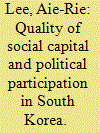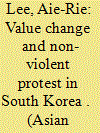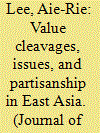|
|
|
Sort Order |
|
|
|
Items / Page
|
|
|
|
|
|
|
| Srl | Item |
| 1 |
ID:
090094


|
|
|
|
|
| Publication |
2009.
|
| Summary/Abstract |
North Korea is a socialist "dynasty" shrouded in secrecy. The regime's inconsistencies leave even the best of North Korean specialists and commentators befuddled as the country's actions invalidate their predictions. One must, however, understand North Korea's sociopolitical ideology in order to appreciate its inconsistencies as a regime. This paper will discuss the impact of North Korea's ideology in historical and sociopolitical context, as well as show the depth of ideological penetration into every layer of its society. The Juche ideology that has characterized the regime is a peculiar combination of nationalism, Marxism, and Confucianism. Since Kim Il-Sung's death, however, and the succession to power of his son, Kim Jong-Il, North Korea's ideology has metamorphosed into a series of sub-ideologies. The purpose of this paper is to elaborate on the process by which North Korean ideology changed and the paradox between the rise in ideological rhetoric and the weakening legitimacy of the regime under Kim Jong-Il.
|
|
|
|
|
|
|
|
|
|
|
|
|
|
|
|
| 2 |
ID:
008511


|
|
|
|
|
| Publication |
April 1995.
|
| Description |
367-376
|
|
|
|
|
|
|
|
|
|
|
|
|
|
|
|
| 3 |
ID:
100271


|
|
|
|
|
| Publication |
2010.
|
| Summary/Abstract |
Previous research claims that associational membership produces social capital. Employing the first wave of the Asian Barometer Survey conducted in 2003, this study investigates the development of social capital and its political consequences in South Korea. Rather than study simple association membership, I examine the quality of civil society (defined as associational commitment and interaction) that individuals pursue through membership. This, I believe, provides a close test of the theoretical impact of social interactions on political participation. The findings indicate that there is a positive association between voluntary activity and two modes of political activity (voting and campaign participation) in different ways and to varying degrees. Associational membership is a significant predictor of voting. In the case of the quality of social capital, associational interaction (talking politics with group members) turns out to be significant in encouraging participation in election campaigns. Overall, my findings on the role of social capital support Putnam's argument that group interactions foster democratic participation.
|
|
|
|
|
|
|
|
|
|
|
|
|
|
|
|
| 4 |
ID:
148945


|
|
|
|
|
| Summary/Abstract |
Using the first, second, and sixth waves of the World Values Surveys, this article examines the extent to which the mass public's values have changed and/or persisted and their impact on political orientations, measured by protest potential and leftist ideology, in Korea. We find that the emergence of an authoritarian-libertarian value cleavage has played an important, if not vital, role in shifting mass political attitudes and in enhancing the propensity to engage in political action from the authoritarian rule, to the democratic transition, and to the period of democratic consolidation. We also empirically uncover our authoritarian-libertarian value scale is related to increasing levels of leftist reform-oriented attitudes, whereas age has become less important to Koreans in defining their orientations to political protest, especially during the period of democratic consolidation.
|
|
|
|
|
|
|
|
|
|
|
|
|
|
|
|
| 5 |
ID:
078406


|
|
|
|
|
| Publication |
2007.
|
| Summary/Abstract |
This article examines how the social transformation in many East Asian democracies is altering the value priorities of their publics, and how these values are affecting party choice. Our analyses are based on the newest wave of the World Values Survey. We find that the emergence of an authoritarian-libertarian value cleavage is clearly associated with level of development, but these values emerge well before what prior research indicated. In addition, we show that party loyalty among the East Asian citizenry is shaped by a mix of social values, economic issues, left-right ideology, distrust in governmental institutions, and proclivities to engage in protest activities.
|
|
|
|
|
|
|
|
|
|
|
|
|
|
|
|
| 6 |
ID:
120963


|
|
|
|
|
| Publication |
2013.
|
| Summary/Abstract |
Using unique survey data collected in 2000 and 2010 and a novel approach to the study of women's movement, this study examines the extent to which the women's movement has persisted and/or changed over the past decade in South Korea. The core emphasis of the paper is on whether Korean women's organizations have changed mobilization repertoires that are important for movement formation, and if so, how and why. The findings indicate two things. First, on one hand, the women's organizations have displayed similar patterns of resource mobilization (i.e., financial situation) over a ten-year period. On the other hand, women have used or have been willing to use different political tactics and alliance strategies to pursue their goals. Second, the younger women's groups, compared to their older counterparts, have collaborated more among themselves and have also been more satisfied with other public and private sectors in addressing women's issues and formulating appropriate policies.
|
|
|
|
|
|
|
|
|
|
|
|
|
|
|
|
|
|
|
|
|